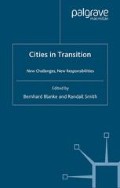Abstract
This chapter addresses the theme of Local Issues and Global Implications. Its thesis is that towards the end of the twentieth century successful cities must reflect, and at the same time reinforce, a regional identity since, with the possible exception of the largest world cities — of which there is only one in Britain — cities are too small to create a sense of economic or political identity appropriate to the twenty-first century. In terms of politics and governance the issue is whether the locality — the city-region in general but the Bristol city-region in particular — has sufficient political and administrative capacity to secure the necessary coordination and control for ‘global’ competition, yet is also sufficiently flexible to sustain the ‘local’ identity necessary for success in that competition.
Access this chapter
Tax calculation will be finalised at checkout
Purchases are for personal use only
Preview
Unable to display preview. Download preview PDF.
References
K. Bassett, ‘Partnerships, business elites and urban politics: new forms of governance in an English city’, Urban Studies, 33 (1996).
J. Bradbury and J. Mawson (eds), British Regionalism and Devolution (London: Jessica Kingsley, 1997).
City Region Campaign, Building a New Britain: an Alternative Democratic Vision for the United Kingdom and its Constitution (London: The City Region Campaign, 1996).
R. Clements, Local Notables and the City Council (London: Macmillan, 1969).
The Constitution Unit, Regional Government in England (London: The Constitution Unit, 1996).
M. Coombes, ‘Definition of city regions in the United Kingdom’, Appendix to Building a New Britain: an Alternative Democratic Vision for the United Kingdom and its Constitution (London: The City Region Campaign, 1996).
L. DeGroot, ‘City Challenge: competing in the urban regeneration game’, Local Economy, 7:3 (1992).
Department of the Environment, Index of Local Conditions (London: DoE, 1994).
Department of the Environment, Transport and the Regions, Regeneration Programmes: The Way Forward (London, DETR, 1997).
A. DiGaetano, ‘Urban governing alignments and realignments in comparative perspective: developmental politics in Boston, Massachusetts, and Bristol, England 1980–86’, Urban Affairs Review, 32:6 (1997).
European Commission, Europe 2000+ Co-operation for European Territorial Development (Luxembourg: Office for the Official Publications of the European Commission, 1995).
Haldane, Report of the Machinery of Government Committee (The Haldane Report), Cmnd 9230 (London: HMSO, 1918).
A. Harding, R. Evans, M. Parkinson and P. Garside, Regional Government in Britain: an Economic Solution (Bristol: The Policy Press, 1996).
H. Heclo and A. Wildavsky, The Private Government of Public Money (London: Macmillan, 1981).
B.W. Hogwood, The Integrated Regional Offices and the Single Regeneration Budget, Research Paper 13 (Commission for Local Democracy, 1995).
B.W. Hogwood, Mapping the Regions: Boundaries, Co-ordination and Government (Bristol: The Policy Press, 1996).
P. John and A. Whitehead (eds), ‘Regionalism in England: current trends and future prospects’, Policy and Politics, 25:1 (1997).
Joint Strategic Planning and Transportation Unit, Service Plan and Budget 1996–97 and 1997–98 (Bristol: Joint Committee for Strategic Planning and Transportation, 1996).
D. King, ‘Economic activity and the challenge to local government’, in D. King and J. Pierre (eds), Challenges to Local Government (London: Sage,1990).
R. Leach, ‘The missing regional dimension to the local government review’, Regional Studies, 28:8 (1994).
Local Government Commission, Renewing Local Government in the English Shires: A Progress Report (London: HMSO, 1993).
P. Malpass, ‘Policy making and local governance: how Bristol failed to secure City Challenge funding (twice)’, Policy and Politics, 22:4 (1994).
J. Mawson et al., The Single Regeneration Budget: Stocktake: A Review of Challenge Round II (Birmingham: Centre for Urban and Regional Studies, University of Birmingham, 1996).
D.C. Miller, ‘Decision making cliques in community power structures: a comparative study of an American and an English City’, American Journal of Sociology, LXI (1958a).
D.C. Miller, ‘Industry and community power structure: a comparative study of an American and an English city’, American Sociological Review, XXIII (1958b).
N. Oatley and C. Lambert, ‘Evaluating competitive urban policy: the City Challenge Initiative’, in R. Hambleton and H. Thomas (eds), Urban Policy Evaluation (London: Paul Chapman Publishing, 1995).
P. Roberts, Regional Strategy and Partnership in European Programmes: Experience in Four UK Regions (York: York Publishing Services, 1996).
D. Senior, The Royal Commission on Local Government in England 1966–1969 Report, Cmnd 4040, Vol. II (Memorandum of Dissent) (London: HMSO, 1969).
D. Snape and M. Stewart, Keeping up the Momentum: Partnership in Bristol and the West of England, Report to the Bristol Chamber of Commerce and Initiative (Bristol, 1996).
South West Regional Planning Conference, Revised Regional Strategy: Priority Issues Report (Taunton: South West Regional Planning Conference, 1996).
M. Stewart, ‘Between Whitehall and town hall: the realignment of urban regeneration policy in England’, Policy and Politics, 22:2 (1994).
M. Stewart, ‘The politics of local complacency’, Journal of Urban Affairs, 18:2 (1996).
M. Stewart, The Work of the Local Government Commission for England 1991–96, Joseph Rowntree Foundation (York: York Publishing Services, 1997a).
M. Stewart, ‘The shifting institutional framework’, in J. Bradbury and J. Mawson (eds), British Regionalism and Devolution (London: Jessica Kingsley, 1997b).
M. Stewart and J. Underwood, ‘Inner cities policy’, in K. Young and C. Mason (eds), Urban Economic Development (London: Macmillan, 1984).
Editor information
Editors and Affiliations
Copyright information
© 1999 Palgrave Macmillan, a division of Macmillan Publishers Limited
About this chapter
Cite this chapter
Stewart, M. (1999). The Politics of Interdependence — Risk and Uncertainty in the City-Region. In: Blanke, B., Smith, R. (eds) Cities in Transition. Anglo-German Foundation for The Study of Industrial Society. Palgrave Macmillan, London. https://doi.org/10.1057/9780333982273_3
Download citation
DOI: https://doi.org/10.1057/9780333982273_3
Publisher Name: Palgrave Macmillan, London
Print ISBN: 978-0-333-74661-5
Online ISBN: 978-0-333-98227-3
eBook Packages: Palgrave Social & Cultural Studies CollectionSocial Sciences (R0)

